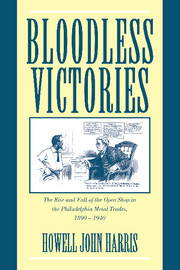Book contents
- Frontmatter
- Contents
- Figures and Tables
- Acknowledgments
- Abbreviations
- 1 Introduction
- 2 The Iron Masters
- 3 Laying the Foundations: Peace and War in the Metal Trades, c. 1890–1904
- 4 Combat, Crisis, and Consolidation, 1904–1915
- 5 “The Largest, Strongest, and Most Valuable Association of Metal Manufacturers in Any City”
- 6 Riding the Storm, 1915–1918
- 7 The War After the War, 1918–1923
- 8 Pacific Passage: Quaker Employers and Welfare Capitalism, c. 1905–1924
- 9 A Liberal Interlude: The Modernization of the MMA, c. 1924–1931
- 10 The Deluge: The Great Depression and the End of the Open Shop
- 11 The New World: Accommodation and Adjustment, 1936–1939
- 12 Afterword: “We'll Still Be There. We're Not Going Away”
- Appendix: Databases Referred to in Text: Nature, Sources, Use
- Index
7 - The War After the War, 1918–1923
Published online by Cambridge University Press: 21 September 2009
- Frontmatter
- Contents
- Figures and Tables
- Acknowledgments
- Abbreviations
- 1 Introduction
- 2 The Iron Masters
- 3 Laying the Foundations: Peace and War in the Metal Trades, c. 1890–1904
- 4 Combat, Crisis, and Consolidation, 1904–1915
- 5 “The Largest, Strongest, and Most Valuable Association of Metal Manufacturers in Any City”
- 6 Riding the Storm, 1915–1918
- 7 The War After the War, 1918–1923
- 8 Pacific Passage: Quaker Employers and Welfare Capitalism, c. 1905–1924
- 9 A Liberal Interlude: The Modernization of the MMA, c. 1924–1931
- 10 The Deluge: The Great Depression and the End of the Open Shop
- 11 The New World: Accommodation and Adjustment, 1936–1939
- 12 Afterword: “We'll Still Be There. We're Not Going Away”
- Appendix: Databases Referred to in Text: Nature, Sources, Use
- Index
Summary
What follows war is not necessarily peace. In this chapter, we will examine the waning of the war labor program and the disintegration of the war economy, and the resultant withering of Philadelphia labor's prospects for a change of fortune. In 1919–20, while the Great Steel Strike and the President's Industrial Conference mapped out the collapse of wartime hopes for a fundamental transformation of the landscape of U.S. labor relations, the Philadelphia metal trades witnessed their own smaller scale tragedies as the liberal state withdrew, unemployment returned, employers unsheathed their swords, and their union adversaries began to implode.
The reconstruction of the labor relations Old Order in the Philadelphia metal trades was not a tidy process. It required struggle. Strangely enough, Philadelphia metalworkers and their families did not all seem to understand that what was required of them was once again obedience and gratitude. Instead, they had to be retaught the lesson of their powerlessness. Echoes of the wartime insurgency therefore rumbled on for three more years, until the victories of the city's and nation's Open Shop employers in their “American Plan” anti-union offensives, and the short but savage recession of 1920–21, ushered in the Republican “New Era.” At the end of this period, labor was shattered. The MMA, its members, and their allies appeared at last to have the field to themselves. The major question facing them would be an ironic result of their success: What future faced an anti-union employers' association after the death of its opponents?
THE AFTERMATH, 1918–1921
Machinists leader Bill Kelton and his members were doomed to disappointment.
- Type
- Chapter
- Information
- Bloodless VictoriesThe Rise and Fall of the Open Shop in the Philadelphia Metal Trades, 1890–1940, pp. 249 - 281Publisher: Cambridge University PressPrint publication year: 2000



